Yankee Doodle Dandy Blu-ray Movie
HomeYankee Doodle Dandy Blu-ray Movie 
Warner Archive CollectionWarner Bros. | 1942 | 126 min | Not rated | Oct 14, 2014
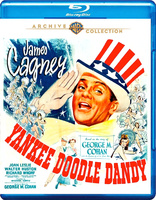
Movie rating
7.9 | / 10 |
Blu-ray rating
| Users | 5.0 | |
| Reviewer | 4.5 | |
| Overall | 4.5 |
Overview
Yankee Doodle Dandy (1942)
A musical portrait of composer/singer/dancer George M. Cohan. From his early days as a child-star in his family's vaudeville show up to the time of his comeback at which he received a medal from the president for his special contributions to the US, this is the life- story of George M. Cohan, who produced, directed, wrote and starred in his own musical shows for which he composed his famous songs.
Starring: James Cagney, Joan Leslie, Walter Huston, Richard Whorf, Irene ManningDirector: Michael Curtiz
| Romance | Uncertain |
| Musical | Uncertain |
| Biography | Uncertain |
| Drama | Uncertain |
Specifications
Video
Video codec: MPEG-4 AVC
Video resolution: 1080p
Aspect ratio: 1.33:1
Original aspect ratio: 1.37:1
Audio
English: DTS-HD Master Audio 2.0 Mono (48kHz, 24-bit)
Subtitles
English SDH
Discs
50GB Blu-ray Disc
Single disc (1 BD)
Playback
Region free
Review
Rating summary
| Movie | 5.0 | |
| Video | 4.5 | |
| Audio | 4.5 | |
| Extras | 4.0 | |
| Overall | 4.5 |
Yankee Doodle Dandy Blu-ray Movie Review
My Mother Thanks You, My Father Thanks You, My Sister Thanks You and I Thank You—for this Blu-ray
Reviewed by Michael Reuben October 15, 2014George M. Cohan, nicknamed "The Man Who Owned Broadway", was a legendary showman with such a quintessential American success story that Hollywood would have eventually gotten around to making a movie about him on its own. But as with everything else in his career, Cohan left nothing to chance. He shopped his own story to the studios, retaining unheard-of approval over script, star and the film itself. Having originally envisioned himself being played by Fred Astaire, Cohan was persuaded by studio head Jack Warner to consider James Cagney, who resembled Cohan in stature, build and Irish heritage. The deciding factor, however, was Cohan's discovery that Cagney, for all his reputation as a tough guy in gangster pictures, had gotten his start just as Cohan did: as a dancer on the vaudeville stage. Indeed, Cohan had once rejected the young Cagney for a part in one of his shows. Informed of that fact, Cohan reportedly said, "Shows how smart I'm not!" The author of such patriotic anthems as "Over There" and "It's a Grand Old Flag", Cohan had been awarded the Gold Congressional Medal in 1936 for his contributions to World War I morale (an event that Yankee Doodle Dandy shifts forward by several years for dramatic purposes). Although his story couldn't help but be an unabashed celebration of America, the production acquired new urgency when, shortly after filming began, Japanese forces attacked Pearl Harbor and America entered World War II. By the time the film was released in June 1942, a new ending had been written to address America's wartime footing. The film that Cohan had originally envisioned as his legacy also provided much-needed morale in the face of a current crisis, an effect attributable in no small measure to Cagney's remarkable portrayal. "What an act to follow!" said Cohan, after seeing himself portrayed by Cagney. The ailing showman was speaking metaphorically, because he knew he'd never perform again; he died later that year after a battle with cancer. Yankee Doodle Dandy broke box office records for Warner Bros., received eight Oscar nominations and won three, including Best Actor for Cagney. It may seem strange that an actor whose most famous roles are violent gangsters should have won his only Academy Award for playing a song-and-dance man, but watch the film and you'll understand. Except for when Cohan is a child, Cagney is in almost every scene, and everything he does is electric. His dance moves are so demanding that today we'd assume they were performed by body doubles or enhanced by camera tricks, but director Michael Curtiz never has to cut away. His star dazzles without any assistance.
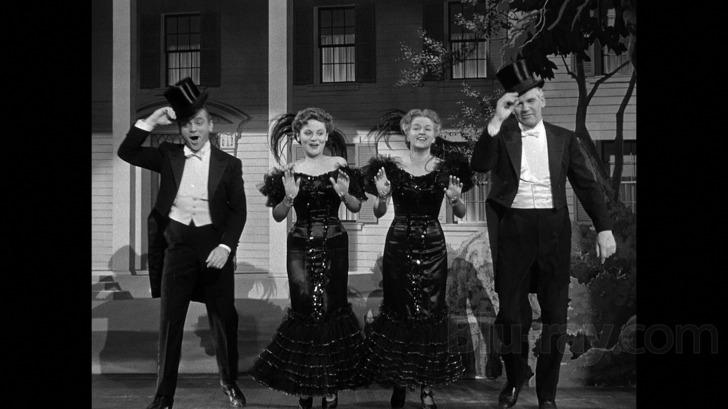
Taking liberties with chronology, Yankee Doodle Dandy opens just as the U.S. has entered World War II. Cohan (Cagney) has come out of retirement to star on Broadway in the Kaufman & Hart musical, I'd Rather Be Right, in which Cohan plays a satirical version of President Franklin D. Roosevelt. After an early performance, the star receives a mysterious summons to the White House, where the real FDR (Capt. Jack Young, with voice dubbed by Art Gilmore) greets him warmly and asks about his life in show business. For the next two hours, as measured by the clock on the President's desk, Cohan recounts his story. Prophetically born on the Fourth of July to vaudevillian parents Jerry Cohan (the wonderful Walter Huston) and Nellie Cohan (Rosemary DeCamp), George is soon joined by his younger sister, Josie (played as an adult by Cagney's sister, Jeanne) to form the successful act known as "The Four Cohans". Even as a boy, young George's star power is obvious, as is his diva temperament. The latter quality wins him a reputation as difficult and sometimes causes conflicts with his father, but it's also the source of the boundless confidence that will sustain him through a long period of rejection when, as a young man, George goes to New York and begins searching for a backer who will take a chance on the shows he has been writing for himself. By then, George has already connected with Mary (Joan Leslie), the woman who will eventually become his wife. (In fact, Mary is a composite character combining qualities of Cohan's two wives; she's named Mary so that Cohan's song "Mary's a Grand Old Name" can be scripted as having been written for her.) In a partnership with struggling playwright Sam Harris (Richard Whorf) that, in the film's version, happens purely by accident, Cohan has his first success, which begins a continuous string of hits never again equaled in Broadway history. His family rejoins him, appears with him in shows and reviews, and the middle section of Yankee Doodle Dandy alternates between efficient montages (assembled by future director Don Siegel) showing Cohan's domination of the Great White Way and full-scale production numbers that recreate some of his most famous crowd pleasers. When the U.S. enters World War I, Cohan tries to enlist but is told that he's eight years over the age limit. Instead, he writes "Over There" and performs for the troops. Both during and after the war, he continues to write and produce until, after his father's passing—a scene played with such intense emotion by Huston and Cagney that director Curtiz broke down in tears—he retires to spend more time with Mary. But show business is never far from Cohan's heart, and when the call comes from his old partner Sam Harris to star in I'd Rather Be Right, Cohan returns. Yankee Doodle Dandy is unusual among show business bio-pics, because they typically portray a struggle to succeed, followed by some sort of personal crisis or collapse when success turns out to have its pitfalls. Cohan's story is different. Having been raised in show business and effectively managed his family's affairs since he was a teenager, Cohan had few illusions. He knew that the difference between failure and success was primarily a matter of hard work and persistence, and he also had the benefit of a supportive and close-knit family behind him (an element of Cohan's life that Yankee Doodle Dandy stresses). He also knew audiences from one end of the country to the other, and he had a stage performer's habit of paying attention to his surroundings: to how the crowd reacted to his performance each day, to what worked and what didn't, to what his fellow performers were doing. Cagney emphasizes this aspect of Cohan's character in the way he shows him listening closely to whoever he's with, whether it's Mary talking about a new song, a producer who might be willing to finance a show, or a big Broadway star (played by Irene Manning) that he and Sam Harris are trying to land for their next production. Cagney's portrayal shows you why Cohan never had time for self-doubt. He was too busy paying attention to everyone and everything around him.
Yankee Doodle Dandy Blu-ray Movie, Video Quality 
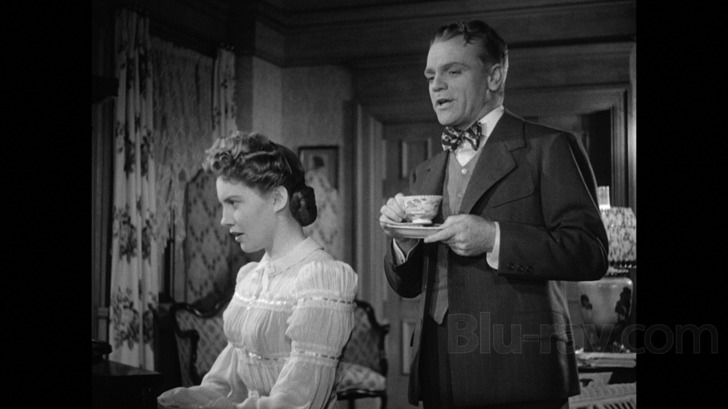
The Warner Archive Collection has struck another winner with their 1080p, AVC-encoded Blu-ray of Yankee Doodle Dandy, which was shot by legendary cinematographer James Wong Howe, a two-time Oscar winner for Hud and The Rose Tattoo. Although studio head Jack Warner complained that setups took too long because of Howe's meticulous lighting, the results speak for themselves in the visual storytelling supplied by the DP's expressive use of light and shadow. WAC's image is beautifully detailed, so that even the most elaborate Broadway production numbers can be appreciated in all their complexity of sets, costumes and numerous extras. The blacks are excellent, and the shades of gray are finely delineated, lending a sense of depth to the image so that Cagney's spirited dance moves often seem to be defying gravity. The Blu-ray's picture is so sharp that it's easy to spot the "locations" that have been created on soundstages, including the farm to which the senior Cohans retire, but the sharpness is neither harsh nor, to my eye, artificially enhanced. The only minor (very minor) issue I noted is an occasional and fleeting bit of video noise that looks like aliasing, always in the fine patterns of clothing. I doubt most viewers will even notice. WAC continues to aim for higher average bitrates than its corporate sibling, Warner Home Video; in this case, the average is 27.99 Mbps, which is excellent for a black-and-white film with substantial "windowbox" bars at the sides.
Yankee Doodle Dandy Blu-ray Movie, Audio Quality 
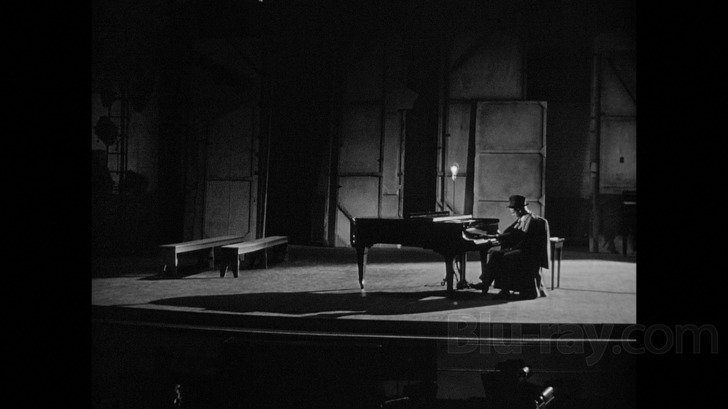
The film's original mono track is encoded in lossless DTS-HD MA 2.0 with identical left and right front channels. Especially with a musical, some studios would been tempted to try a 5.1 remix, but WAC has wisely left well enough alone, because Yankee Doodle Dandy's track is sufficiently robust to be effective in reproducing the Oscar-winning scoring (by Ray Heindorf and Heinz Roemheld) of Cohan's songs and the carefully balanced rendition of the vocal performances by Cagney and others against a variety of pianos, bands and Broadway orchestras. (The film also won an Oscar for sound recording.) The limitations of the dynamic range only reveal themselves occasionally, e.g., when Irene Manning's Fay Templeton gives the simple song "Mary's a Grand Old Name" a star's rendition with operatic highs that test the limits of the era's recording technology.
Yankee Doodle Dandy Blu-ray Movie, Special Features and Extras 
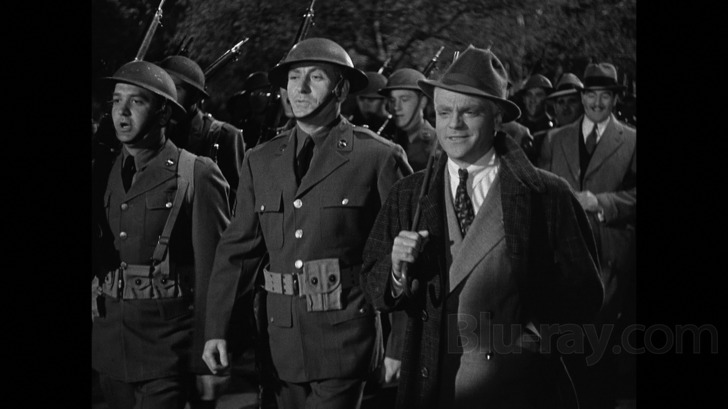
The extras have been ported over from Warner's 2003 DVD of Yankee Doodle Dandy.
- Commentary with Film Historian Rudy Behlmer: Few commentaries can be called encyclopedic, but Behlmer's is one of them. Having studied the Warner production records, he provides detail as minute as the dates when individual scenes were shot, which soundstages were used and who called "action!" He also knows the résumés of all the supporting players. (He's like a genial IMDb—without the ads.) If there's one essential extra on this disc, it's Behlmer's commentary.
- Warner Night at the Movies 1942 (480i; 1.33:1)
- Introduction by Leonard Maltin (3:21): The critic and film historian provides an introduction to the various short subjects from 1942 listed below.
- Casablanca Trailer (2:16): Written by Julius and Irving Epstein, who did uncredited rewrites on Yankee Doodle Dandy.
- Newsreel (9:16): A West Point graduation; the U.S. air corps in China; volunteers for naval service in Houston; Mexico declares war; British tanks to the U.S.S.R.; the air corps in Australia; FDR reviews the troops.
- Patriotic Short Subject Beyond the Line of Duty (22:01): Narrated by a young Ronald Reagan, this short tells the story of how an average cowboy joins the Army air corps and becomes a war hero.
- Merrie Melodies Cartoon Bugs Bunny Gets the Boid (1080p; 7:25).
- Let Freedom Sing!: The Story of Yankee Doodle Dandy (480i; 1.33:1; 44:31): This 2003 production by Turner Entertainment provides an overview of both Cohan's career and the production of Yankee Doodle Dandy. Most of the participants are scholars and critics, including commentator Rudy Behlmer, but the documentary benefits from the lively participation of Joan Leslie, who remembers working on the film with great fondness.
- John Travolta Remembers James Cagney (480i; 1.33:1; 5:09): In his later years, Cagney did not typically meet new people, but he made an exception for Travolta when their mutual friend, producer A.C. Lyles, informed Cagney that the newly minted star was a dancer.
- You, John Jones (Wartime Short starring Cagney) (480i; 1.33:1; 10:26): Cagney plays John Jones, a volunteer air raid warden who imagines, while on duty, what it must be like to live in countries on whose soil the war is being fought.
- Looney Tunes Short Yankee Doodle Daffy (1080p; 1.33:1; 6:44): Other than featuring Daffy as a theatrical agent, this cartoon doesn't have much to do with Yankee Doodle Dandy.
- Theatrical Trailer (480i; 1.33:1; 3:56).
- Audio Vault
- You Remind Me of My Mother (Outtake) (1:29)
- You're a Grand Old Flag (Cagney Rehearsal) (1:41)
- Give My Regards to Broadway (Cagney Rehearsal) (1:07)
- Four Cohans Medley (Vocal with Piano) (0:42)
- Harrigan (Vocal with Piano) (1:29)
- Lady Esther Screen Guild Theater Radio Show (10/19/1942) (29:31): A radio presentation of highlights from Yankee Doodle Dandy featuring James Cagney, Joan Leslie, Walter Huston and Jean Cagney.
- Song Selection: WAC's menus typically do not contains chapter selections, but the menu for Yankee Doodle Dandy provides a listing of twenty songs performed during the film, to which the viewer can jump directly.
Yankee Doodle Dandy Blu-ray Movie, Overall Score and Recommendation 
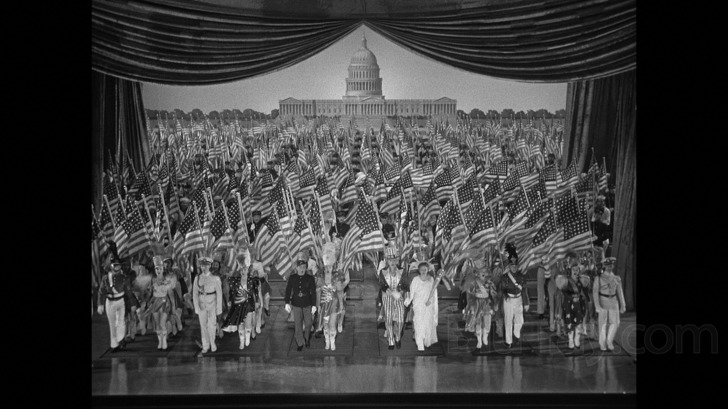
I'm not a big fan of dance performance, but I love great acting, and the dancing in Yankee Doodle Dandy is an essential expression of George M. Cohan's character. When the hoofer tries to prove to the Army recruiters that he's just as fit as the younger men they're accepting, he does it by showing them the kind of routine he performs every night. Even the Recruiting Major is impressed. Much about Yankee Doodle Dandy sounds (and is) dated. Its square-jawed patriotism is no longer fashionable in today's highly politicized climate, and the era it evokes, when vaudeville houses, nightclub revues and theatrical venues were the primary source of popular entertainment, has long since passed into history. But a great performance never dates, and Yankee Doodle Dandy features one of America's finest movie stars at the peak of his powers, newly invigorated by the opportunity to return to his roots and bond with another Irish song-and-dance man. Cagney's obvious joy in playing the eternally confident Cohan is infectious. It lifts the film out of its time and beyond. WAC has treated it well. Highest recommendation.
Similar titles
Similar titles you might also like

Ziegfeld Girl
Warner Archive Collection
1941

Funny Girl 4K
1968

Burlesque
2010

The Last Five Years
2014

Harlow
1965

Three Little Words
Warner Archive Collection
1950

Rhapsody in Blue
Warner Archive Collection
1945

It's Always Fair Weather
Warner Archive Collection
1955

Young Man with a Horn
Young Man of Music / Warner Archive Collection
1950

A Star Is Born
1954

Cabaret
Reissue
1972

Pal Joey
1957

A Star Is Born
1976

Nine
2009

Brooklyn
2015

Rent
2005

Dirty Dancing: Havana Nights
2004

An American in Paris
1951

For Me and My Gal
Warner Archive Collection
1942

Saawariya
2007